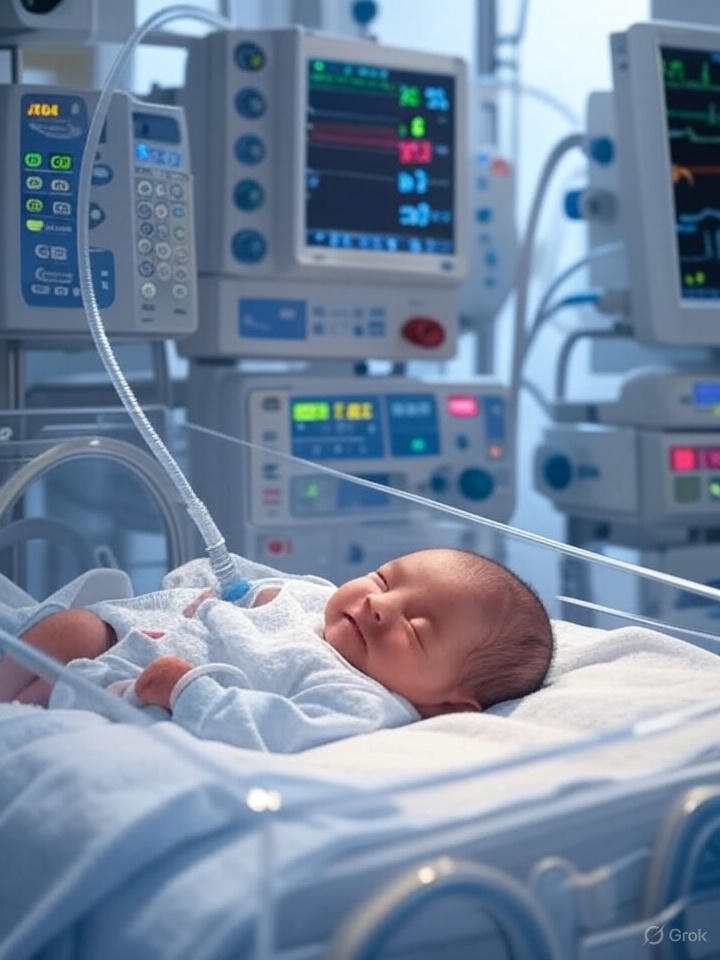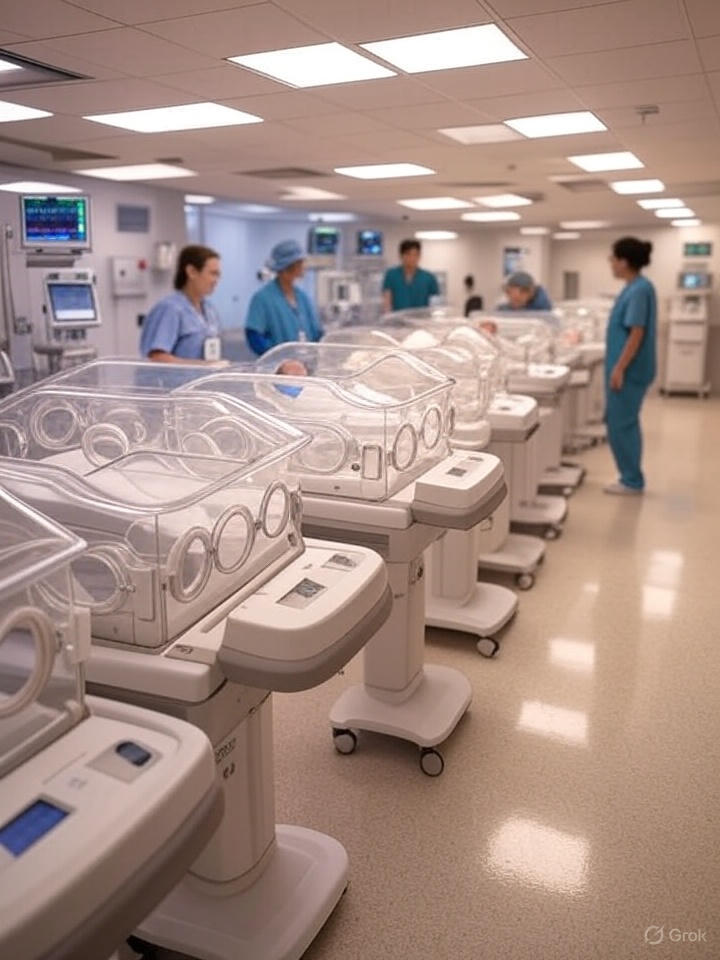The Neonatal Intensive Care Unit (NICU) is a specialized medical unit designed to provide critical care for newborns who require immediate medical attention. Understanding which babies need NICU care can help expecting parents prepare emotionally and practically for what might be an unexpected journey. This comprehensive guide explores the various conditions and circumstances that lead to NICU admissions, helping parents navigate this challenging but crucial aspect of newborn care.
What Is a NICU?
The Neonatal Intensive Care Unit is a specialized hospital ward equipped with advanced medical technology and staffed by healthcare professionals trained specifically in newborn care. According to the American Academy of Pediatrics, NICUs are classified into different levels based on their capabilities, from Level I (basic newborn care) to Level IV (highest level of neonatal care).
These units serve as lifelines for vulnerable newborns, providing 24/7 monitoring, specialized equipment, and expert medical care. The World Health Organization estimates that approximately 15 million babies are born prematurely worldwide each year, with many requiring intensive care support.
Primary Reasons Babies Are Admitted to NICU

Premature Birth (Preterm Delivery)
Premature birth is the leading cause of NICU admissions. Babies born before 37 weeks of pregnancy are considered premature, with those born before 28 weeks requiring the most intensive care. According to Wikipedia’s comprehensive overview, preterm birth complications are the leading cause of death among children under 5 years of age globally.
Categories of Premature Birth:
- Extremely preterm: Born before 28 weeks
- Very preterm: Born between 28-32 weeks
- Moderate to late preterm: Born between 32-37 weeks
Premature babies often struggle with:
- Underdeveloped lungs leading to breathing difficulties
- Temperature regulation problems
- Feeding challenges
- Higher risk of infections
- Developmental delays
Low Birth Weight
Babies weighing less than 5 pounds 8 ounces (2,500 grams) at birth are classified as having low birth weight. Those weighing less than 3 pounds 5 ounces (1,500 grams) are considered very low birth weight. The Centers for Disease Control and Prevention reports that low birth weight affects about 1 in 12 babies in the United States.
Low birth weight can occur due to:
- Premature birth
- Intrauterine growth restriction (IUGR)
- Multiple pregnancies (twins, triplets)
- Maternal health conditions
- Nutritional deficiencies during pregnancy
Respiratory Complications
Many newborns require NICU care due to breathing-related issues. These complications can range from temporary breathing difficulties to severe respiratory conditions requiring mechanical ventilation.
Common Respiratory Conditions Include:
Respiratory Distress Syndrome (RDS): Most common in premature babies, RDS occurs when the lungs lack sufficient surfactant, a substance that helps keep the air sacs open.
Transient Tachypnea of the Newborn (TTN): A temporary condition where babies breathe rapidly due to fluid remaining in the lungs after birth.
Meconium Aspiration Syndrome: Occurs when babies inhale meconium-stained amniotic fluid during delivery, potentially causing breathing difficulties and lung inflammation.
Persistent Pulmonary Hypertension: A serious condition where blood pressure in the lungs remains abnormally high after birth.
Congenital Heart Defects
Congenital heart defects affect approximately 1 in 100 babies born in the United States, according to the American Heart Association. Many of these babies require immediate NICU care for monitoring and potential surgical interventions.
Types of Heart Defects Requiring NICU Care:
- Hypoplastic left heart syndrome
- Tetralogy of Fallot
- Transposition of the great arteries
- Ventricular septal defects
- Atrial septal defects
Infections and Sepsis

Newborns have immature immune systems, making them vulnerable to infections. Neonatal sepsis is a serious bloodstream infection that can be life-threatening without prompt treatment. The Mayo Clinic emphasizes that early recognition and treatment of neonatal infections are crucial for positive outcomes.
Risk Factors for Neonatal Infections:
- Premature rupture of membranes
- Maternal fever during labor
- Group B Strep (GBS) infection in the mother
- Prolonged labor
- Invasive medical procedures
Birth Complications and Trauma
Difficult deliveries can sometimes result in birth injuries requiring NICU care. These complications may include:
Hypoxic-Ischemic Encephalopathy (HIE): Brain injury caused by lack of oxygen and blood flow during birth.
Fractures: Most commonly clavicle or arm fractures during difficult deliveries.
Nerve Injuries: Such as brachial plexus injuries affecting arm movement.
Intracranial Hemorrhage: Bleeding within the brain, more common in premature babies.
Neurological Conditions
Some babies are born with or develop neurological conditions that require intensive monitoring and care. These may include:
- Seizures
- Neural tube defects (spina bifida, anencephaly)
- Hydrocephalus (excess fluid in the brain)
- Cerebral palsy
Gastrointestinal Issues
Digestive system problems can prevent babies from feeding normally, requiring NICU intervention. Common conditions include:
Necrotizing Enterocolitis (NEC): A serious intestinal condition primarily affecting premature babies.
Gastroschisis: A birth defect where intestines develop outside the baby’s body.
Esophageal Atresia: A condition where the esophagus doesn’t connect properly to the stomach.
Intestinal Blockages: Various conditions that prevent normal digestion and feeding.
Multiple Births and NICU Care
Babies from multiple pregnancies (twins, triplets, or higher-order multiples) have a significantly higher chance of NICU admission. According to Forbes Health, multiple births account for a disproportionate percentage of NICU admissions due to:
- Higher likelihood of premature birth
- Lower birth weights
- Increased risk of complications during pregnancy and delivery
- Competition for nutrients in the womb
- Higher rates of birth defects
Maternal Health Conditions Affecting NICU Admission
Several maternal health conditions can increase the likelihood of NICU admission for newborns:
Diabetes During Pregnancy
Both gestational diabetes and pre-existing diabetes can affect fetal development and birth outcomes. Babies born to mothers with diabetes may experience:
- Macrosomia (unusually large birth weight)
- Hypoglycemia (low blood sugar) after birth
- Respiratory distress
- Increased risk of birth defects
Preeclampsia and Eclampsia
These serious pregnancy complications can necessitate early delivery, often resulting in premature babies who require NICU care. The condition affects both mother and baby, potentially causing:
- Intrauterine growth restriction
- Placental abruption
- Premature delivery
- Low birth weight
Substance Use During Pregnancy
Babies exposed to alcohol, drugs, or tobacco during pregnancy may require NICU care for:
- Withdrawal symptoms
- Growth restrictions
- Birth defects
- Respiratory problems
- Feeding difficulties
Signs That May Indicate NICU Admission
Healthcare providers assess several factors when determining if a newborn needs NICU care:
Apgar Scores
The Apgar test, performed at 1 and 5 minutes after birth, evaluates five criteria: heart rate, respiratory effort, muscle tone, reflex response, and skin color. Low Apgar scores may indicate the need for intensive care.
Vital Signs Monitoring
Abnormal heart rate, breathing patterns, or blood pressure may signal the need for NICU admission.
Physical Appearance and Behavior
Healthcare providers look for signs such as:
- Difficulty breathing or unusual breathing patterns
- Blue coloring (cyanosis) of lips, tongue, or skin
- Excessive sleepiness or difficulty waking
- Poor feeding or inability to feed
- Unusual muscle tone (too floppy or too stiff)
- Seizures or unusual movements
Levels of NICU Care
Understanding the different levels of NICU care can help parents better comprehend their baby’s needs:
Level I: Well Newborn Nursery
Provides care for healthy newborns and those with minor issues that resolve quickly.
Level II: Special Care Nursery
Cares for babies born after 32 weeks with moderate complications or those recovering from Level III care.
Level III: Neonatal Intensive Care Unit
Provides comprehensive care for critically ill newborns, including those requiring mechanical ventilation.
Level IV: Regional NICU
Offers the highest level of care, including complex surgical procedures and advanced life support.
The NICU Experience: What Parents Can Expect
Initial Admission Process
When a baby is admitted to the NICU, parents may feel overwhelmed. The admission process typically involves:
- Medical evaluation and stabilization
- Placement in an appropriate bed or incubator
- Attachment to monitoring equipment
- Development of a care plan
Medical Equipment and Monitoring
NICU babies are often connected to various medical devices:
- Heart and breathing monitors
- Pulse oximeters to measure oxygen levels
- IV lines for medications and nutrition
- Ventilators or CPAP machines for breathing support
- Feeding tubes if unable to feed orally
Healthcare Team
The NICU team includes:
- Neonatologists (specialized pediatricians)
- NICU nurses
- Respiratory therapists
- Pharmacists
- Social workers
- Nutritionists
Supporting Your Baby in the NICU
Kangaroo Care
Also known as skin-to-skin contact, kangaroo care has proven benefits for NICU babies, including:
- Improved heart rate and breathing patterns
- Better temperature regulation
- Enhanced bonding between parent and baby
- Increased breast milk production in mothers
Feeding and Nutrition
Nutrition is crucial for NICU babies’ growth and development. Feeding methods may include:
- Breast milk (preferred when possible)
- Specialized premature infant formulas
- Total parenteral nutrition (TPN) through IV
- Combination feeding approaches
Understanding normal newborn behaviors can help parents recognize when something might be concerning. For instance, ear rubbing is a common behavior in babies that usually isn’t cause for alarm, as explained in our comprehensive guide on why babies rub their ears.
Long-term Outcomes and Follow-up Care
Discharge Planning
NICU discharge occurs when babies can:
- Maintain stable body temperature
- Feed adequately by mouth
- Gain weight consistently
- Breathe without assistance
- Have stable vital signs
Follow-up Care
Many NICU graduates require ongoing medical care and monitoring, including:
- Regular pediatric check-ups
- Developmental assessments
- Specialized care for ongoing conditions
- Early intervention services if needed
Developmental Considerations
NICU babies may face increased risks for:
- Developmental delays
- Learning disabilities
- Sensory impairments (vision or hearing problems)
- Behavioral challenges
However, with proper follow-up care and early intervention, many NICU graduates go on to lead healthy, normal lives.
Prevention and Risk Reduction
While not all NICU admissions can be prevented, expectant parents can take steps to reduce risks:
Prenatal Care
Regular prenatal care is crucial for:
- Monitoring fetal development
- Managing maternal health conditions
- Identifying potential complications early
- Planning for high-risk deliveries
Healthy Lifestyle Choices
Maintaining a healthy lifestyle during pregnancy includes:
- Avoiding alcohol, tobacco, and illegal drugs
- Eating a nutritious diet
- Taking prenatal vitamins
- Managing stress
- Getting adequate rest
Managing Chronic Conditions
Proper management of pre-existing health conditions like diabetes or hypertension can reduce the risk of complications.
Financial Considerations and Support
Insurance Coverage
NICU care can be expensive, with costs potentially reaching hundreds of thousands of dollars. Most insurance plans cover NICU care, but parents should:
- Understand their coverage limits
- Work with hospital financial counselors
- Explore additional assistance programs if needed
Support Resources
Various organizations provide support for NICU families:
- March of Dimes
- National Association of Neonatal Nurses
- Hand to Hold
- Local NICU parent support groups
Emotional Support for Families
Coping with NICU Stress
Having a baby in the NICU can be emotionally challenging for families. Common feelings include:
- Fear and anxiety about their baby’s health
- Guilt or self-blame
- Overwhelm from medical information
- Difficulty bonding with their baby
Building Resilience
Strategies for coping include:
- Seeking support from healthcare teams
- Connecting with other NICU parents
- Maintaining self-care practices
- Celebrating small milestones
- Accessing professional counseling if needed
For families dealing with the stress of NICU care, finding moments of peace and reflection can be helpful. Resources like inspirational content, including Bible verse generators, can provide comfort and strength during difficult times.
Future Advances in Neonatal Care
Technological Innovations
Advances in neonatal care continue to improve outcomes:
- Improved ventilation techniques
- Better nutritional support
- Advanced monitoring systems
- Telemedicine capabilities
- Artificial intelligence in diagnosis and treatment
Research and Development
Ongoing research focuses on:
- Prevention of preterm birth
- Improved treatments for neonatal conditions
- Better pain management for NICU babies
- Enhanced family-centered care approaches
Conclusion
Understanding which babies are kept in the NICU helps parents prepare for potential challenges and recognize the critical care their newborns may need. While a NICU stay can be frightening and overwhelming, these specialized units provide life-saving care that gives vulnerable babies the best possible start in life.
The reasons for NICU admission are varied and complex, ranging from premature birth and low birth weight to congenital conditions and birth complications. However, with advances in neonatal medicine and dedicated healthcare teams, outcomes for NICU babies continue to improve.
For parents facing a NICU journey, remember that:
- You are not alone in this experience
- NICU teams are specially trained to care for your baby
- Every small step forward is significant
- Your presence and participation in care matter
- Resources and support are available to help your family through this challenging time
The NICU journey is often unexpected and always challenging, but with proper medical care, family support, and time, many NICU babies go on to thrive and lead healthy lives. Understanding the conditions that lead to NICU care empowers parents to be advocates for their children and active participants in their care journey.
By staying informed, seeking support, and working closely with healthcare teams, families can navigate the NICU experience with greater confidence and hope for their baby’s future. The specialized care provided in these units represents the best of modern medicine’s ability to support the most vulnerable among us – our newest and smallest family members.
This comprehensive guide provides general information about NICU care and should not replace professional medical advice. Always consult with healthcare providers for specific concerns about your baby’s health and care needs.





Pingback: How Long is the Newborn Phase? A Complete Parent’s Guide - Snapspeak